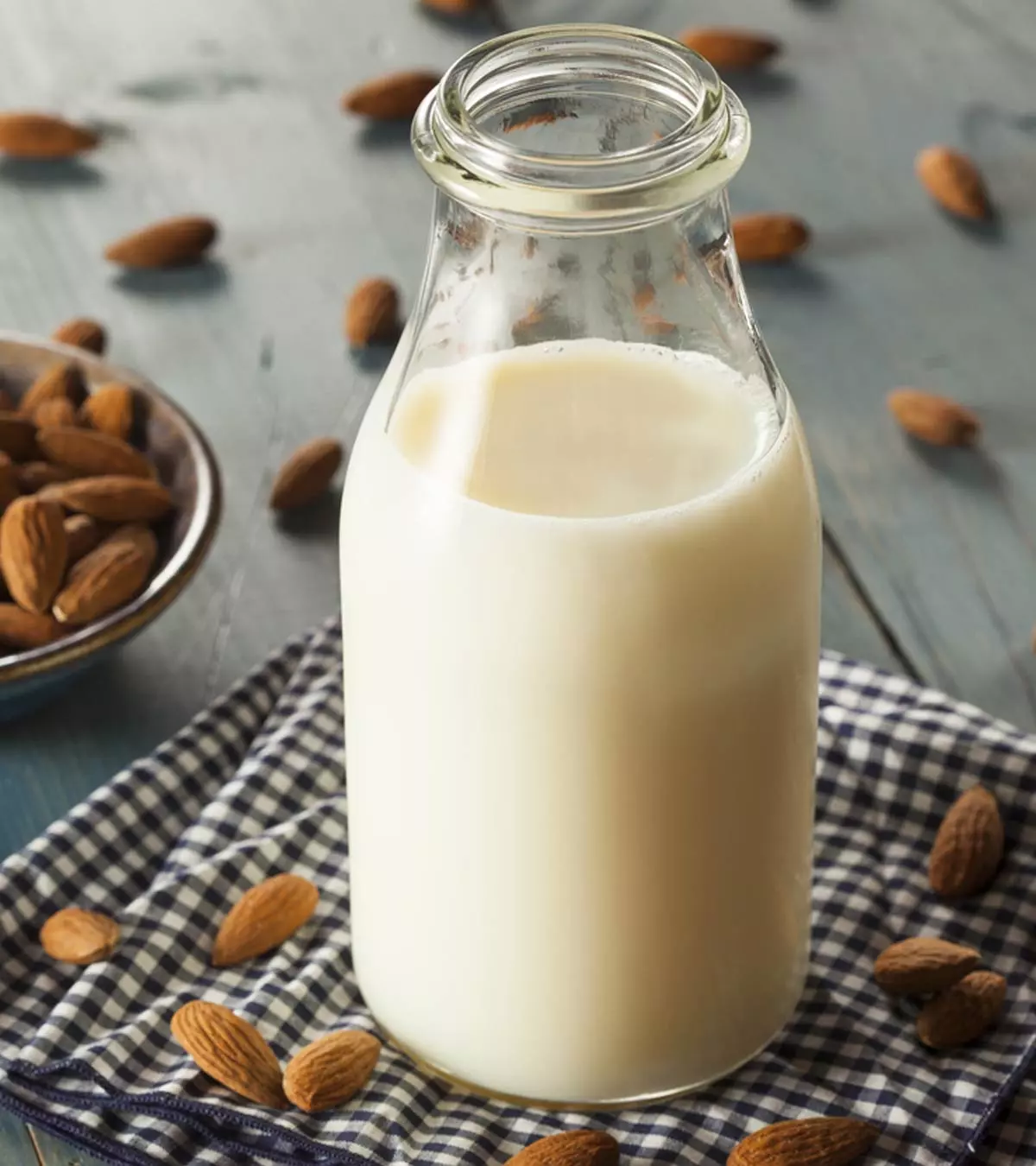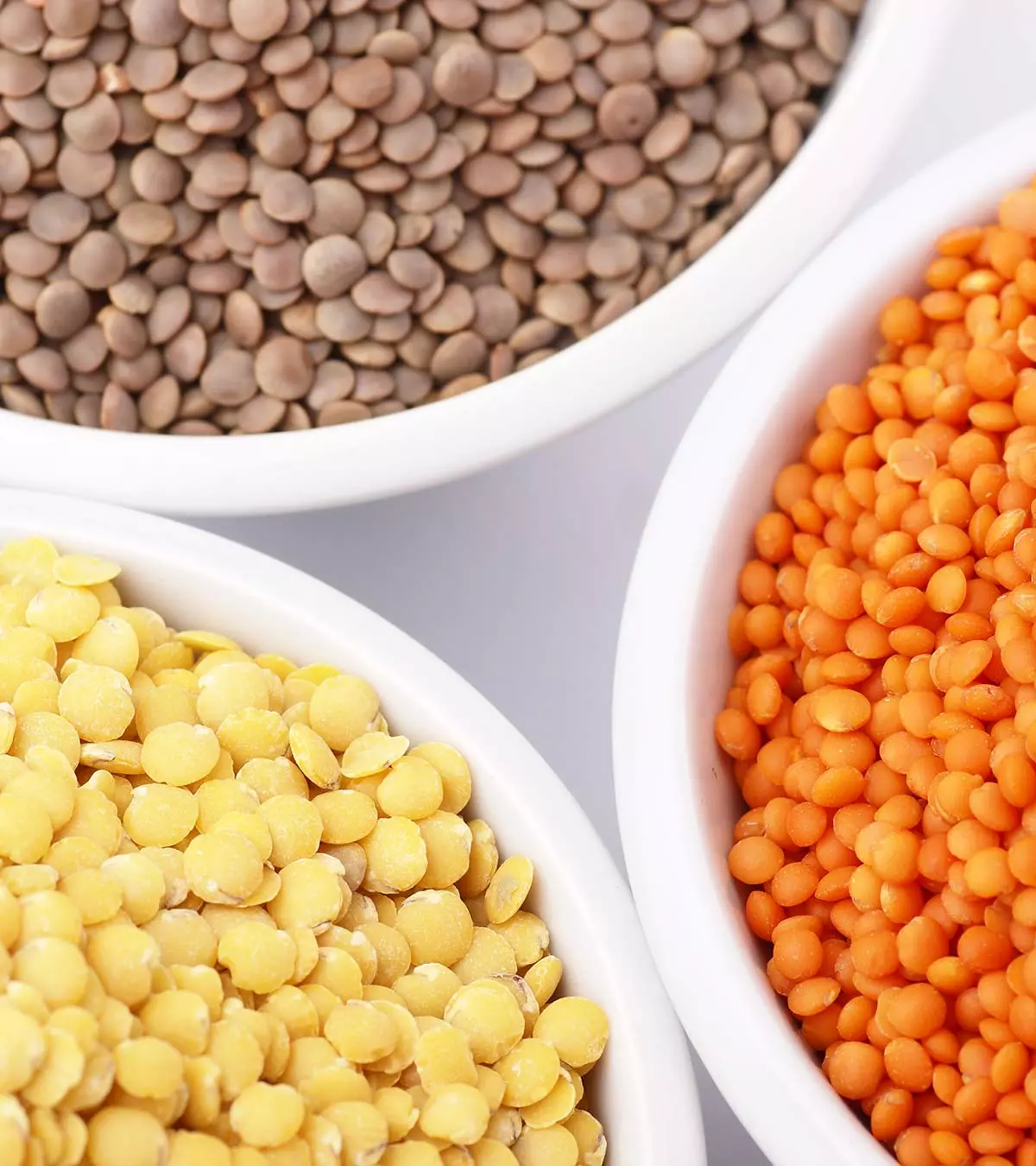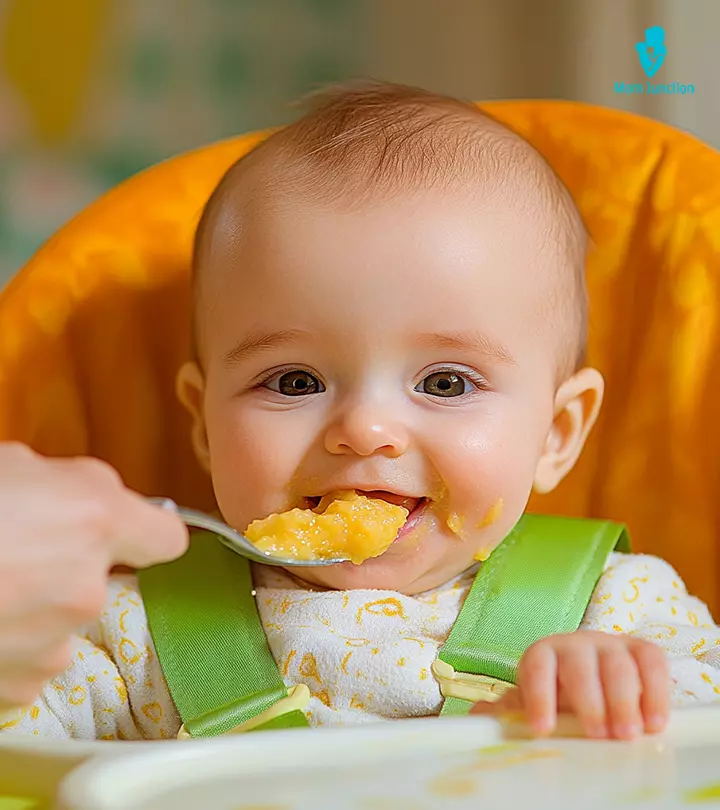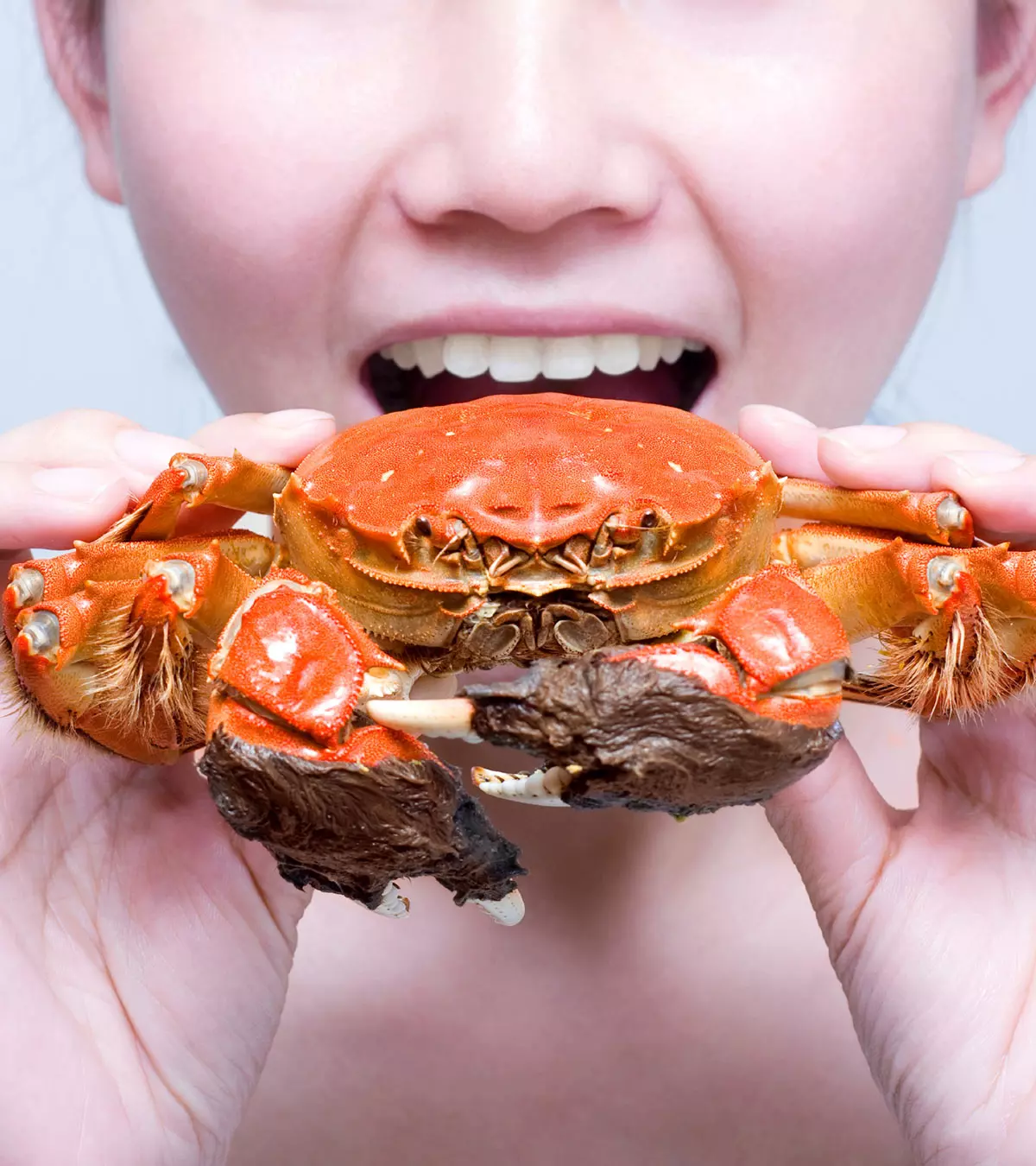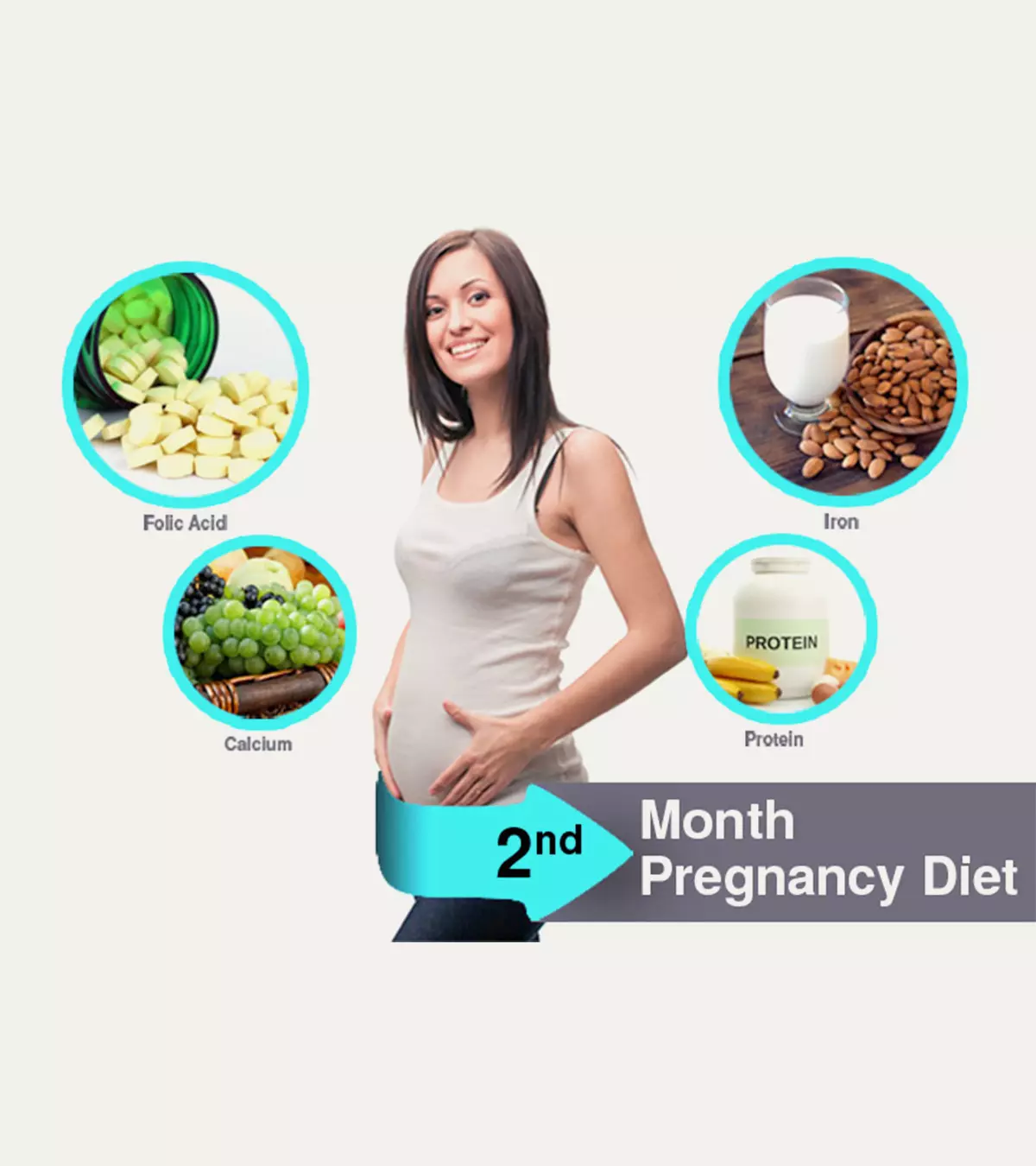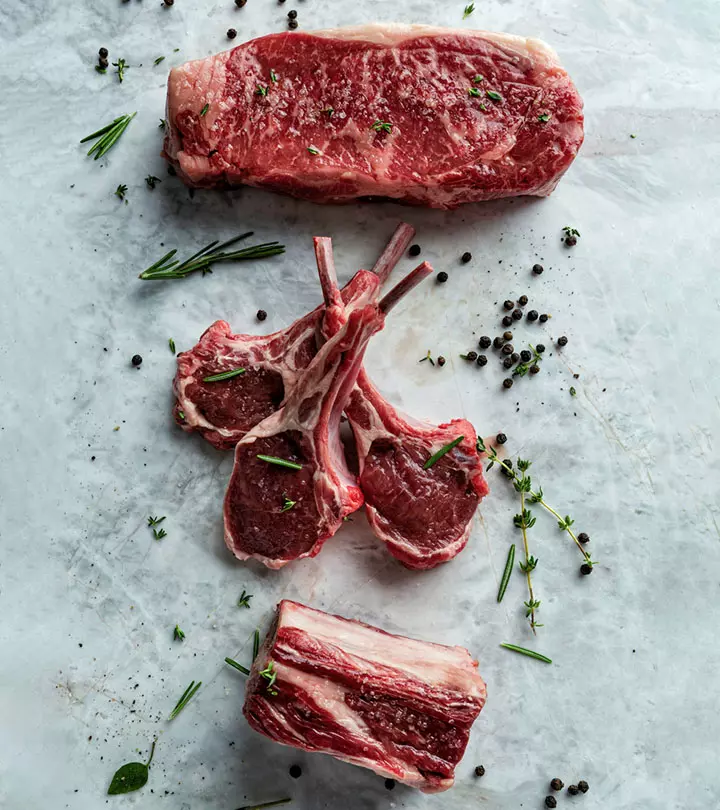
Image: iStock
If you enjoy a delicious meal of lamb chops occasionally, you need not stop eating lamb during pregnancy. Lamb is an excellent source of protein and vitamins that can keep you and your baby healthy (1). It protects you from illnesses while enriching you with nutrients. However, every food should be taken in moderate amounts to avoid any side effects.
Read this post to learn more about eating lamb, including its benefits for pregnant women and precautionary measures to take during its consumption.
Key Pointers
- Lamb is rich in essential vitamins and proteins required during pregnancy.
- Consumption of lamb can increase hemoglobin levels in the body.
- Daily consumption of lamb may lead to an increase in sodium and cholesterol levels.
- Properly cook lamb before consumption to reduce the risks of infections.
Health Benefits Of Eating Lamb During Pregnancy

Image: Shutterstock
Apart from being extremely tasty, lamb is also known to be high in nutritional content. Here are some of the health benefits of eating lamb:
- Being a good source of protein, lamb contributes to the increased protein requirement in pregnancy. Consuming protein-rich foods during pregnancy can support the growth and development of your fetus. It can also help with muscle development (1).
- Lamb is rich in iron, which could raise your hemoglobin level. It helps in the formation of red blood cells. The iron in lamb gets absorbed easily in your body because iron is more readily absorbed from animal protein (1) (2).
- The high amount of zinc contained in meat helps develop the immune system of your fetus, ensuring overall growth along with cell division (1) (3).
- Lamb is a rich source of vitamin B12 that keeps the nervous system healthy, aids the formation of red blood cells, and prevents anemia (1) (4).
- Lamb also contains small amounts of choline and copper, which can help in fetal brain development and optimum growth (5).
 Experts say
Experts sayRisks Of Eating Lamb During Pregnancy
No doubt lamb is a rich source of all vital nutrients you need during pregnancy. However, there are several risk factors of taking lamb that cannot be ruled out completely. Here is what you should know about the probable risk factors of taking lamb daily during pregnancy:
- Lamb contains high amounts of cholesterol and saturated fatsi An unhealthy dietary fat found in meat, dairy, and specific oils such as coconut and palm. that might result in a significant increase in your blood lipid levels. This is certainly not desirable in pregnancy (1).
- Lamb is rich in sodium. Hence, excessive intake in pregnancy can increase your blood pressure level and can lead to unwanted consequences (6).
- HistaminesiAn immune system chemical involved in inducing allergic response and regulating muscle and blood vessel contractions. in lamb may result in allergies in some. EczemaiItchy and dry skin in response to an allergenic food or specific medications. is one of the most common forms of infections. In some cases, you might also suffer from asthma, cough, runny nose, and anaphylactic shocksiSevere allergic reactions leading to breathing difficulties and loss of consciousness. (7).

Image: Shutterstock
However, if you have the consent of your healthcare provider, you can make lamb dishes and enjoy them.
Precautionary Measures
Lamb has high calorie content, so when you are pregnant, you need to take it in moderation to avoid discomforts such as indigestion. Here are some precautionary measures you can take:
- If you eat lamb, make sure to drink plenty of water.
- While cooking lamb, you must follow the recommended cooking temperature and time guidelines. These handling guidelines will ensure you have cooked the meat to a safe internal temperature.
- Raw meat may contain harmful bacteria like salmonella and listeria that may cause food poisoning. You can prevent most foodborne illnesses by following the cooking guidelines.
- Using a meat thermometer is a good way to prevent undercooked meat.
Quick tip
Always cook lamb steaks, roasts, and chops at 145°F and ground lamb at 160°F. This will ensure they reach their safe internal temperature (11).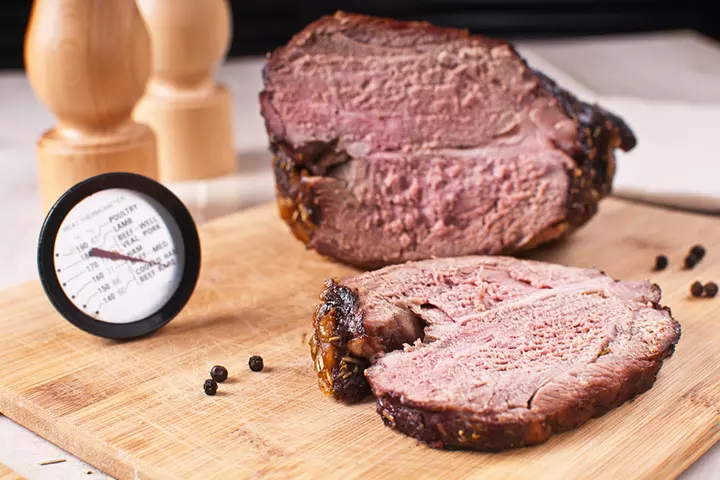
Image: Shutterstock
Before indulging in meat during pregnancy, it’s important to consult with your doctor for medical advice. Your doctor can guide any necessary dietary restrictions and determine if it’s safe for you to consume meat. Additionally, it’s important to be cautious while eating meat and consider any potential risks. If necessary, take precautionary measures.
Frequently Asked Questions
1. Can I eat pink lamb while pregnant?
No, consuming raw, pink, or bloody meat can infect you with toxoplasmosis, a tiny parasite that resides in meat and can be harmful to both mother and baby (9).
2. Can I eat lamb fry when pregnant?
Yes, it is safe to have any meat cooked thoroughly during pregnancy (8). However, consider opting for Mongolian boiled lamb.
3. Can I eat medium lamb when pregnant?
Yes, medium lamb is cooked at a temperature of 160°F, which is higher than the minimum recommended temperature of 145°F. Therefore, it is well cooked and safe to consume during pregnancy (8) (9).
4. Is it safe to eat lamb liver during pregnancy?
While liver is nutritious and rich in folate, it contains high levels of vitamin A (retinol), which could potentially harm your developing baby (10).
5. What should I do if I accidentally eat undercooked lamb?
Monitor yourself for symptoms of food poisoning (nausea, vomiting, diarrhea, fever, stomach cramps) over the next 72 hours, as undercooked lamb can harbor harmful bacteria. Most cases resolve on their own with proper rest and hydration, but seek immediate medical attention if you develop severe symptoms.
Lamb contains protein required for fetal development, iron for hemoglobin synthesis, and other nutrients for other health benefits. However, safety concerns may make you doubt whether you can eat lamb while pregnant. Eating lamb in moderate amounts is safe during pregnancy. However, consuming lamb in excess may increase your blood pressure or blood lipid levels. Remember, it is crucial to have a balanced diet for optimum maternal health. You may feel a craving to have different types of foods during this time. However, you should take appropriate prenatal care and consult your doctor to avoid the negative impacts of food on fetal health.
Infographic: Risks Of Eating Lamb During Pregnancy
Although eating a well-cooked and safe variety of animal meat could be beneficial during pregnancy, too much consumption might put a woman at certain health risks. In the infographic, learn why eating excess meat, such as lamb meat, while pregnant may not be among the good food options.
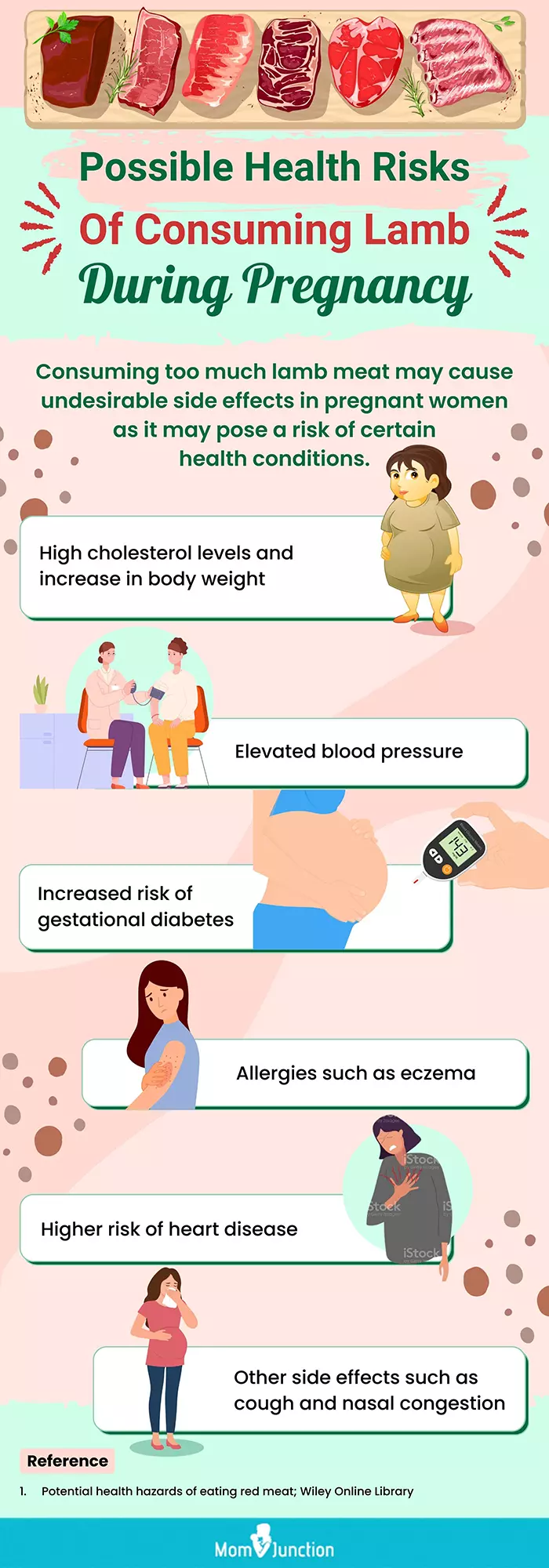
Illustration: Momjunction Design Team
Illustration: Health Benefits Of Eating Lamb During Pregnancy
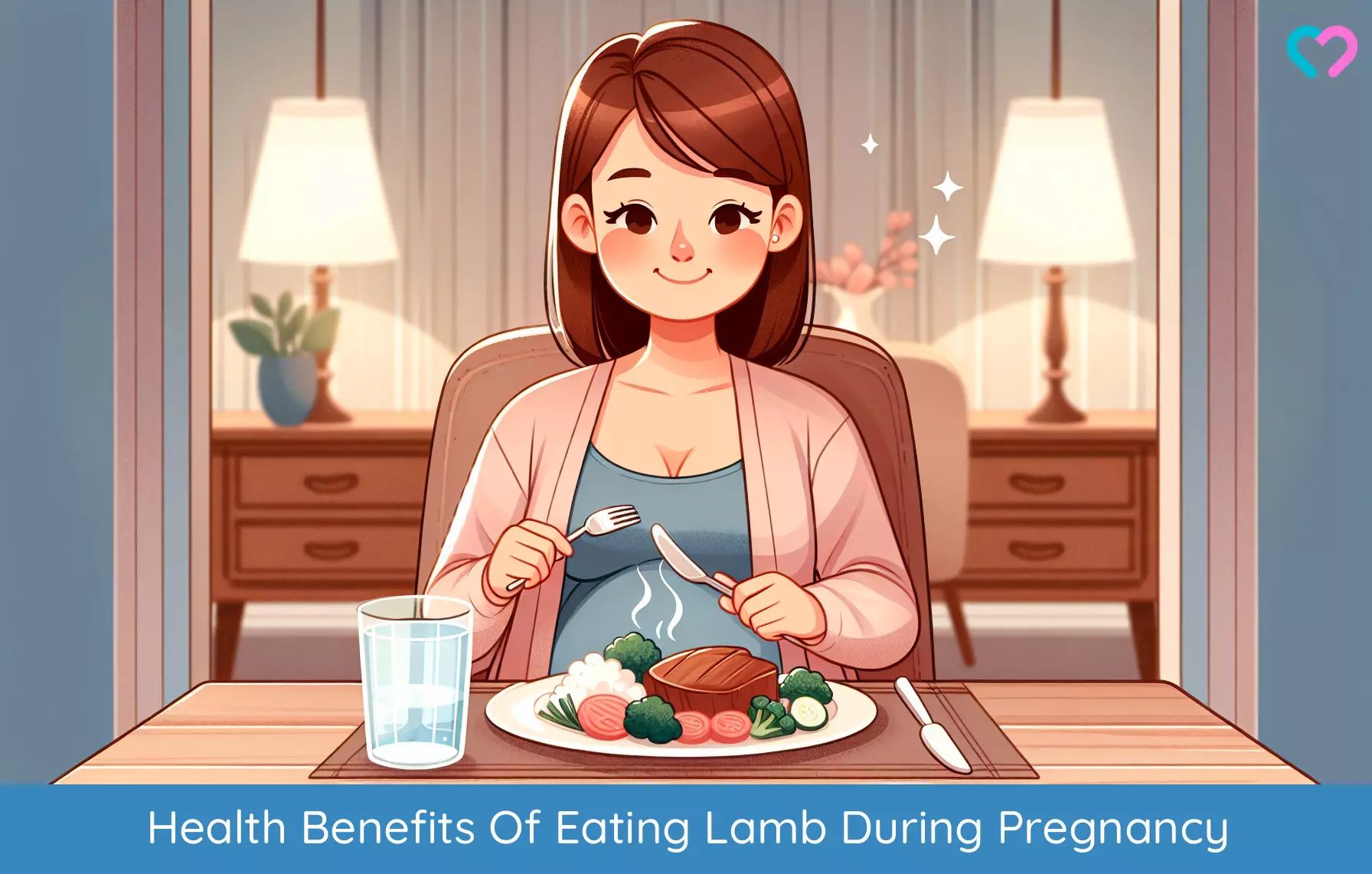
Image: Dall·E/MomJunction Design Team
References
- Michigan lamb is an excellent source of protein, zinc, selenium and B vitamins.
https://www.canr.msu.edu/news/michigan_lamb_is_an_excellent_source_of_protein_zinc_selenium_and_b_vitamin - Hemoglobin and Functions of Iron.
https://www.ucsfhealth.org/education/hemoglobin-and-functions-of-iron - Effect of Zinc Supplementation on Pregnancy and Infant Outcomes: A Systematic Review.
https://www.ncbi.nlm.nih.gov/pmc/articles/PMC3787719/ - B Vitamins in the nervous system: Current knowledge of the biochemical modes of action and synergies of thiamine, pyridoxine, and cobalamin.
https://www.ncbi.nlm.nih.gov/pmc/articles/PMC6930825/ - Top 120 Foods High in Vitamin B9 (Folic Acid).
https://www.foodtips.org/vitamin-b9-foods/ - Lamb, ground, raw.
https://fdc.nal.usda.gov/fdc-app.html#/food-details/174370/nutrients - Lamb triggered histamine release [Units/volume] in Blood.
https://loinc.org/7449-2/ - Foods to avoid in pregnancy.
https://www.tommys.org/pregnancy-information/im-pregnant/nutrition-in-pregnancy/foods-avoid-pregnancy - Proper Cooking Temperatures for Safe Food At Home.
https://www.health.state.mn.us/people/foodsafety/cook/cooktemp.html - Pregnancy and Diet.
https://www.betterhealth.vic.gov.au/health/healthyliving/pregnancy-and-diet - Food Safety Risks for Pregnant Women; Eat Right; Academy of Nutrition And Dietetics
https://www.eatright.org/health/pregnancy/prenatal-nutrition/food-safety-risks-for-pregnant-women
Community Experiences
Join the conversation and become a part of our nurturing community! Share your stories, experiences, and insights to connect with fellow parents.
Read full bio of Jennifer House
Read full bio of Rebecca Malachi
Read full bio of Swati Patwal
Read full bio of Dr. Joyani Das









